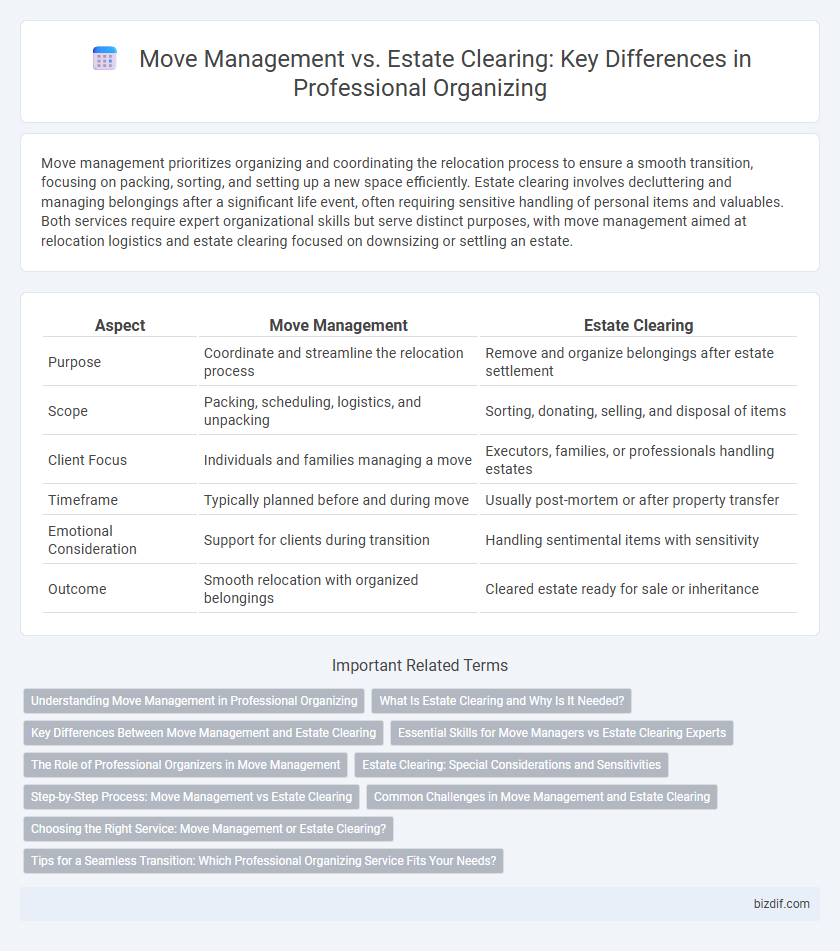Move management prioritizes organizing and coordinating the relocation process to ensure a smooth transition, focusing on packing, sorting, and setting up a new space efficiently. Estate clearing involves decluttering and managing belongings after a significant life event, often requiring sensitive handling of personal items and valuables. Both services require expert organizational skills but serve distinct purposes, with move management aimed at relocation logistics and estate clearing focused on downsizing or settling an estate.
Table of Comparison
| Aspect | Move Management | Estate Clearing |
|---|---|---|
| Purpose | Coordinate and streamline the relocation process | Remove and organize belongings after estate settlement |
| Scope | Packing, scheduling, logistics, and unpacking | Sorting, donating, selling, and disposal of items |
| Client Focus | Individuals and families managing a move | Executors, families, or professionals handling estates |
| Timeframe | Typically planned before and during move | Usually post-mortem or after property transfer |
| Emotional Consideration | Support for clients during transition | Handling sentimental items with sensitivity |
| Outcome | Smooth relocation with organized belongings | Cleared estate ready for sale or inheritance |
Understanding Move Management in Professional Organizing
Move management in professional organizing involves coordinating every aspect of a client's relocation, including sorting, packing, and setting up the new space, ensuring a seamless transition with minimal stress. Estate clearing focuses on efficiently sorting, appraising, and disposing of belongings after an owner's passing or downsizing, often requiring sensitivity and detailed organization. Understanding the distinctions enhances tailored service delivery, with move management emphasizing logistics and client support, while estate clearing prioritizes emotional considerations and value assessment.
What Is Estate Clearing and Why Is It Needed?
Estate clearing involves the systematic sorting, organizing, and removal of personal belongings, often following a significant life event like a death or downsizing. It is needed to efficiently manage the transition of ownership, reduce clutter, and prepare the property for sale, rental, or inheritance distribution. Professional estate clearing services ensure sensitive handling of valuables, donations, and disposables, streamlining the process and reducing emotional stress.
Key Differences Between Move Management and Estate Clearing
Move management involves coordinating logistics, packing, and transportation to ensure a seamless relocation, whereas estate clearing focuses on sorting, appraising, and responsibly disposing of personal belongings after life transitions or downsizing. Essential differences include move management prioritizing efficiency in relocation timelines, while estate clearing emphasizes emotional sensitivity and item valuation. Both services require organizational expertise, but move management centers on forward planning, and estate clearing addresses legacy and disposal considerations.
Essential Skills for Move Managers vs Estate Clearing Experts
Move managers excel in strategic planning, space assessment, and coordination of logistics for seamless relocations, ensuring client preferences and timelines are prioritized. Estate clearing experts specialize in sensitive evaluation, decluttering, and appraisal skills, adept at managing emotional attachments and organizing valuable assets efficiently. Both roles require exceptional communication and organizational skills but differ in focus, with move managers optimizing transitions and estate clearing experts facilitating thoughtful disposals.
The Role of Professional Organizers in Move Management
Professional organizers in move management streamline the relocation process by coordinating logistics, sorting belongings, and ensuring efficient packing and unpacking to reduce stress and save time. They develop customized plans tailored to clients' needs, manage timelines, and collaborate with movers to optimize space utilization. Expertise in organizing systems and prioritizing essential items minimizes clutter and facilitates a smooth transition to the new home.
Estate Clearing: Special Considerations and Sensitivities
Estate clearing requires careful attention to emotional sensitivities and the respectful handling of personal belongings, often involving collaboration with family members and legal representatives. Professionals must navigate sentimental attachments while efficiently organizing, sorting, and disposing of items, ensuring compliance with estate laws and family wishes. Detailed inventory management and secure documentation are essential for transparency and to prevent disputes during the estate clearing process.
Step-by-Step Process: Move Management vs Estate Clearing
Move management involves coordinating logistics, scheduling, and packing to ensure a streamlined relocation, starting with detailed inventory assessment, room-by-room organization, and secure transportation planning. Estate clearing requires systematic sorting, appraising, and disposing of belongings with attention to sentimental and monetary value, often beginning with categorizing items for donation, sale, or disposal, followed by thorough clean-out and property preparation. Both processes demand meticulous planning but differ in objectives: move management prioritizes efficient transition, while estate clearing focuses on comprehensive property liquidation and organization.
Common Challenges in Move Management and Estate Clearing
Move management and estate clearing often face common challenges such as time constraints, emotional attachment to belongings, and logistical complexities. Efficient categorization, prioritizing essential items, and coordinating transportation or disposal services are critical to overcoming these hurdles. Professionals must balance sensitivity with organization to ensure a smooth transition while respecting clients' emotional needs.
Choosing the Right Service: Move Management or Estate Clearing?
Choosing the right service between move management and estate clearing depends on your specific needs and goals. Move management focuses on organizing, packing, and coordinating a smooth relocation, while estate clearing involves sorting, appraising, and disposing of belongings during downsizing or after a loss. Evaluating the scope of your project and desired outcomes ensures you select the professional organizing service that provides maximum efficiency and peace of mind.
Tips for a Seamless Transition: Which Professional Organizing Service Fits Your Needs?
Move management streamlines the relocation process by coordinating logistics, packing, and timing to minimize stress and ensure an efficient move. Estate clearing involves sorting, appraising, and disposing of belongings, often requiring sensitivity and organization to handle sentimental items and legal considerations. Assess your needs based on whether you require comprehensive moving coordination or focused decluttering and estate handling to select the right professional organizing service for a seamless transition.
Move management vs Estate clearing Infographic

 bizdif.com
bizdif.com